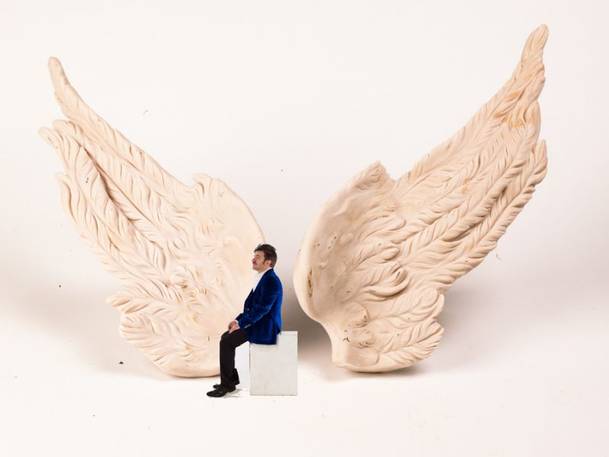


Hailing from Calabria, singer-songwriter Peppe Voltarelli returns to New York, on April 9th at SubCulture New York, after a stop in Chicago, for a concert presenting his new studio album “Lamentarsi come ipotesi” (To Complain as Hypothesis). The album provides a metaphoric soundtrack to a Southern Italian way of life where a culture of complaints becomes a source of pleasure, empowering people to reach into their ancient roots to overcome the challenges of modern life. Throughout Voltarelli takes the listener on a cinematic journey to a unique crossroad of traditional Italian song where Spaghetti Western meets Gypsy and Klezmer intersects with Balkan beats.
Voltarelli is a troubadour, singing and telling stories with a distinctly Calabrian point of view and dialect, pointing out the hypocrisy and deep political corruption in one of Italy’s most troubled regions, but balancing that with a dash of humor and catchy melodies often delivered on acoustic guitar. While he cites such Italian artists as Pier Paolo Pasolini, Roberto Saviano and particularly Domenico Modugno as influences, his music moves well beyond its Italian roots. This is a performer that transcends his bloodlines with a swagger that recalls fellow global pop iconoclasts like Gogol Bordello’s Eugene Hutz, Billy Bragg, Manu Chao or Shane MacGowan, delivering his message with a dynamic intensity and singular style.
Voltarelli got his start in music at the age of 11, eventually founding the popular alternative rock band Il Parto delle Nuvole Pesanti, (The Birth of the Heavy Clouds), a band that mixed punk rock and Calabrian folk traditions. He left that band in 2006 to pursue a solo career. His first album “Distratto Ma Però” was released in 2007 and it was among the finalists for Italy’s prestigious Tenco Prize. Distributed in Europe by Universal, Voltarelli’s second solo album, “Ultima Notte A Malà Strana,” came out in 2010 and won the Tenco Prize for the Best Album in Dialect. It is the first album in Calabrese to do so.
We had the opportunity to speak to Voltarelli before his arrival in the Big Apple.
Tell us about your new studio album, “Lamentarsi come ipotesi.” Is it true that Italians complain all the time and which are their most common complaints?
This is my third solo album and it was conceived and put together in Florence by a group of people that includes, in addition to me, Alessandro "Finaz" Finazzo, producer and guitar player, and Paolo Baglioni. A number of distinguished guest musicians have collaborated with us, including Canzoniere Grecanico Salentino’s Mauro Durante, Grammy-nominated Argentine-American singer-songwriter and guitarist Kevin Johansen, Riccardo Tesi, Otello Profazio and Alessandro Palmitessa. Together we have realized a sizzling mosaic of Italianity, a proactive reflection on our country and an ironic, and at the same time poignant, declaration of love. The CD cover and the booklet were designed by Silvia Panceri and the artists Anna and Rosaria Corcione. In the past I used to think that complaining was a feature of us Calabrese people, or more generally of southern Italians, but with time I realized that people complain no matter of their latitude, geographical location or language spoken. The Italian complaint I like to focus on is an act that exceeds the dramatic sense of the term to become a common daily thing, an unconscious act, a gesture, a funny face...
How do you get inspiration for your songs? And how important are irony and humor?
My songs are micro-tales where a desperate commentator and traveler mixes anecdotes of his life with those if the lives of others, with places, bonds, and possible findings. Through irony I get to speak of very serious issues by keeping things light.
What do you tell about Calabria in your songs?
Hidden environments, views and thoughts... this is what Calabria is to me... moss of nostalgia that every day grows on my life with a live and sour language that does not want to be forgotten.
Singing in the Calabrese dialect is a form of political protest or does it have a more artistic meaning?
Definitely both. A language can be used to do politics and to denounce certain things that do not go properly. But it can also indicate new ways, be proactive and seductive as a piece of art. I think my dialect does both.
You have defined yourself a “cantatore con faccia e chitarra,” (a singer with a face and a guitar, meaning an expressive singer) what does it mean? How important is gestuality in Italian culture?
It's essential. A hand movement, a gaze, a way of walking tell more than words can say. Before writing things down we tell them with our eyes. I love to work on gestures, to discover past ones and to create new ones.
What will you perform for your American audience? And if you had to be inspired by New York for a song what would you write?
I will play music from the new album with a band that includes Paolo Baglioni, drums, and Italo Andriani, base. I think of New York as a city populated with libertarians, where my music and my face have never been foreign but have always felt at home.
Wednesday, April 9, 2014
SubCulture New York
45 Bleecker Street, Downstairs
New York, NY 10012
Doors: 7:00 pm / Show: 7:30 pm
$15.00 Advance / $20.00 At the door
(212) 533-5470
>>> [2]
Source URL: http://ftp.iitaly.org/magazine/events/reports/article/peppe-voltarelli-and-his-southern-italian-way-music
Links
[1] http://ftp.iitaly.org/files/peppevoltarellicover1396832423jpg
[2] http://www.subculturenewyork.com/event/515213-peppe-voltarelli-new-york/